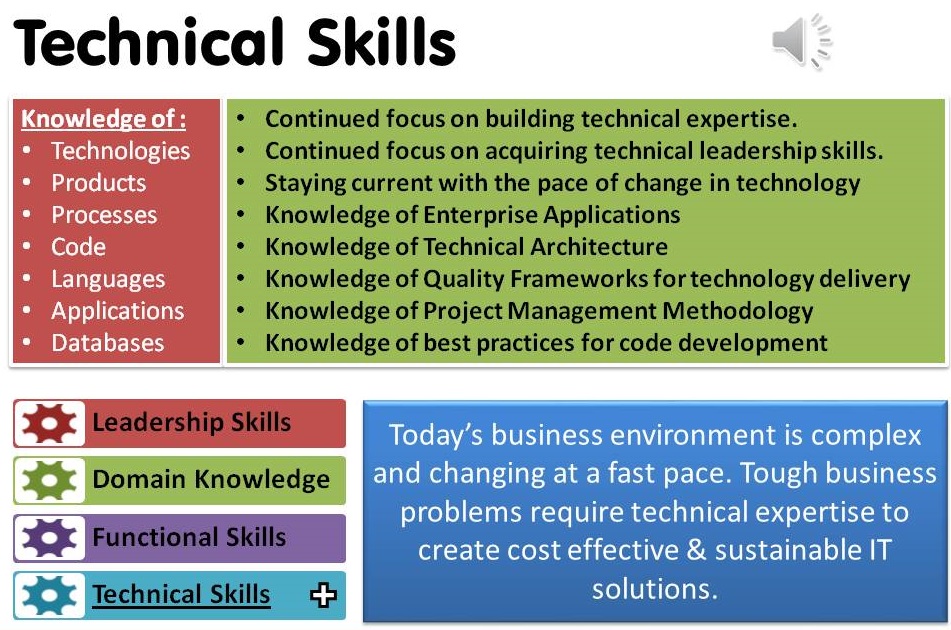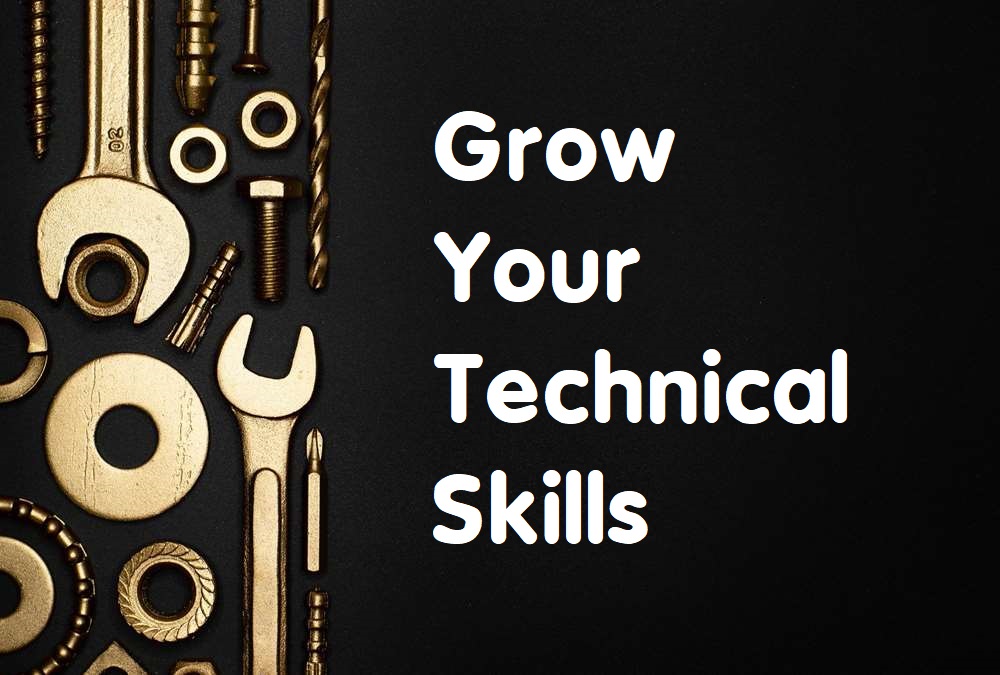- Home
- Business Processes
- Industry Knowledge
- Aerospace Industry
- Automotive Industry
- Banking Domain
- BFSI Industry
- Consumer/ FMCG Industry
- Chemicals Industry
- Engineering & Construction
- Energy Industry
- Education Domain
- Finance Domain
- Hospitality Domain
- Healthcare Industry
- Insurance Domain
- Retail Industry
- Travel and Tourism Domain
- Telecom Industry
- Leadership Skills
- eLearning
- Home
- Leadership Skills
- Career Management
- Importance of Technical Skills
Importance of Technical Skills
Today’s business environment is complex and changing at a fast pace. Tough business problems require technical expertise to create cost-effective & sustainable solutions. All industries need some kind of technical skills to accomplish complex actions, tasks, and processes relating to computational and physical technology as well as a diverse group of other enterprises. The acquisition of advanced technical skills requires specific education certification or training, often with practical hands-on learning.
Your employee should have superior technical skills than you. If he doesn't, it means you have hired the wrong person.
- Jack Ma
What do we mean by Technical Skills?
Technical skills are the abilities and knowledge needed to perform specific tasks. Technical skills also refer to the expertise of a certain type of market participant who uses technical analysis signals to buy and sell stocks, bonds, futures, and other financial instruments. They are practical and often relate to mechanical, information technology, mathematical, or scientific tasks. Typical technical skills are programming, the analysis of complex figures, or the use of specific tools.
Technofunc defines technical skills as gaining knowledge of:
- Technologies: More you understand the latest technologies the more competitive you are.
- Products: Latest technical products and the solutions they offer for business problems.
- Processes: technical Processes and how they integrate with business processes;
- Code: Knowledge of underlying code for your chosen technical area.
- Languages: Different software languages to write build the code.
- Applications: Enterprise-wide applications that provide a solution to current technological issues.
- Databases: Knowledge of databases and database management.
Today’s business environment is complex and changing at a fast pace. Tough business problems require technical expertise to create cost-effective & sustainable IT solutions.
Examples of Technical Skills
With the unprecedented growth in the IT and Software Industry, many folks associate and believe that technical skills are coding skills and required only for jobs related to information technology (IT) and other fields in the sciences. However, all industries need some kind of technical skills to accomplish complex actions, tasks, and processes relating to computational and physical technology as well as a diverse group of other enterprises. Technical skills are practical ones, typically related to the fields of mechanics, information technology, mathematics, and science.
Technical skills vary widely between industry and job type. For computer programmers, knowledge of various coding languages is considered a technical skill. Some examples include knowledge of programming languages, design programs, mechanical equipment, or tools. In finance, technical skills include an array of knowledge topics that include computing abilities, quantitative analysis, and various financial market forecasting techniques.
Given below are some examples of technical skills:
- Business intelligence/analytics
- Project management skills
- Big data and computing
- Developers and programmers including IT Coding and IT security
- Database management
- Cloud and SaaS
- Technical writing
- Operating Systems
- Stock Analysis
- Data Analysis
- Web development
- Android and iOS and Mobile apps and digital management
- Help desk/Technical support
Who are Technical Experts?
Those who possess technical skills are often referred to as "technicians", like electronics experts, computer experts, software developers, programmers, and a variety of other designations. Technical skills are a specialized set of knowledge required to perform practical tasks in the areas of mechanics, science, and mathematics, and information technology. In finance, technical skills may refer to technical analysts who do an analysis of stocks and share prices and provide advice to investors. In most cases, the acquisition of advanced technical skills requires specialized training or education. The acquisition of advanced technical skills requires specific education certification or training, often with practical hands-on learning.

Importance of Technical Skills
Every job requires a different skillset and that’s why the technical skills are most demanded and very important for every career for a number of reasons. They give you the fundamental expertise and can help you work more efficiently, boost your confidence, and make you a more valuable candidate for employers. Technical experts often receive higher pay compared to other generic profiles. Businesses are always on the lookout for specialized knowledgeable staff, as their clients expect to work with highly skilled teams who they have confidence in to deliver the results they need.
How to build Technical Skills?
To build technical expertise you should:
- Keep your continued focus on building technical expertise
- Also along the way focus on acquiring technical leadership skills
- Try to stay current with the pace of change in technology
- Gain knowledge of enterprise applications
- Build your understanding of technical architecture.
- Learn quality frameworks for technology delivery like six sigma and the Capability Maturity Model
- Acquire knowledge of Project Management Methodology and certification in project management
- Document and learn best practices for code development
If you take care of all these aspects in your day to day professional life you will build a strong technical foundation that will help you at higher levels in your career.
Building a Technical Career Path
When you get out of your college and decide to pursue a career in Information Technology; you start as a Trainee. At this stage you focus your efforts on gaining more and more knowledge about your chosen technology; and you take roles that expect you to do; code development, programming, or exhibit other technical skills; like testing or documenting.
In the next stage of IT career, you broaden your technical expertise; and you start gaining depth in many technologies. Here you grow into roles demanding; technical design, technical analysis; or project implementation. At this level, you start getting exposure to project management and IT leadership concepts. As you grow further, professionals start expanding outside their technical domain and start gaining domain knowledge and functional skills. You also gain a lot of leadership skills and move to people management & organization development roles.
Even in such technical lines as engineering, about 15% of one's financial success is due one's technical knowledge and about 85% is due to skill in human engineering, to personality and the ability to lead people.
- Dale Carnegie
Related Links
You May Also Like
-
Guide to Technical Leadership Skills
Technical leaders care about building amazing products and the best technical capabilities in their teams. Everything they do is focused on improving the user experience and bringing competitive advantage for their organization. Learn the skills and competencies you need to build a technical career path for yourself that starts with building technical expertise and grows into developing technical leadership.
-
Narrative leadership is interpreted as the leader who aspires to construct leadership by telling stories. Leadership is a task of persuasion, of winning people’s minds and hearts. Storytelling is thus inherently suited for the task of leadership. Learn about the narrative leadership style and how to use this style to inspire and motivate followers or to manage change.
-
Concept & Definition of Stress
Stress is a popular expression used by people in day to day life. Pressures of day to day living sometimes necessitate coping or dealing with them and stretch the body beyond its natural capacity. They are called stressors. Stress is a natural, ongoing dynamic, and interactive process that takes place as people adjust to their environment.
-
Reasons behind Wastage of Time
Under-utilization of time may be due to the faulty system or faults of manager/officer/leader or due to lack of planning. There could be many factors driving the procrastination behavior like system issues, personal work habits, and lack of delegation, personality traits, and bad working habits of the leader, failure to tackle interpersonal conflicts, obstacles, and lack of far-sightedness.
-
In our present Hitech scenario, society is changing very fast. What are the skills that are most relevant for leaders in relation to the changing economic environment? Leaders need to develop skills to drive innovation and change in order to play a more central role in their organizations’ activities. How do managers accept the change and meet business expectations by becoming a key figure in driving change and innovation?
-
Importance of Technical Skills
Today’s business environment is complex and changing at a fast pace. Tough business problems require technical expertise to create cost-effective & sustainable solutions. All industries need some kind of technical skills to accomplish complex actions, tasks, and processes relating to computational and physical technology as well as a diverse group of other enterprises. The acquisition of advanced technical skills requires specific education certification or training, often with practical hands-on learning.
-
The best career choices are ones that match your values. Each person has several values that are important to him. These values are highly personal and knowing them provides a clearer sense of what's most important to you in your life and career. Career values are the beliefs you consider important from a work standpoint. Values help you understand what you want from a job? Explore a few examples of work values that can influence career path and job satisfaction.
-
What are some of the smartest things you can do in your early career that can help you become successful? The more you challenge yourself early on and gain a multitude of experiences and skills, the more successful you'll become down the road. In this article, we have compiled our best career advice including tips from career and recruitment experts. Here are some important tips to keep in mind as you plan your education and training, your career, and your life.
-
In today's business world, proficiency in management skills is essential for career growth and success. Managerial skills can be defined as attributes or abilities that are essential for every leader and manager to succeed and fulfill specific tasks expected from them by the organization.
-
Technology represents tremendous value if you view it from the proper perspective. IT empowerment also has its various levels in any organization. As a CIO or IT Senior Leader, you should try to move the technology function up the value chain. Learn how to transform your service delivery organization being looked upon as another cost center to a business partner that provides valuable services and brings competitive advantage for the business.
Explore Our Free Training Articles or
Sign Up to Start With Our eLearning Courses

About Us
Learning
© 2023 TechnoFunc, All Rights Reserved










